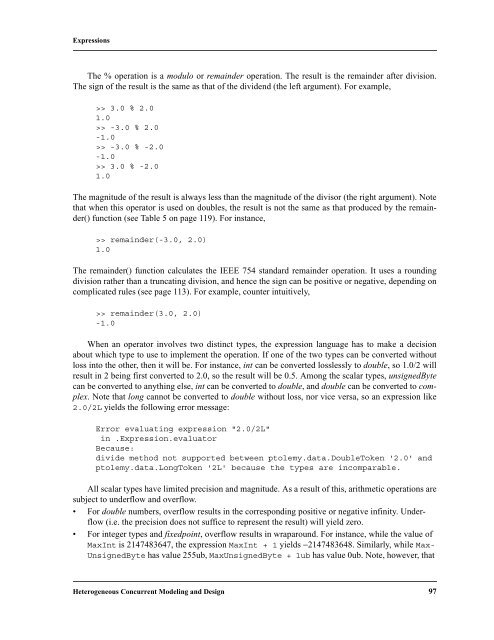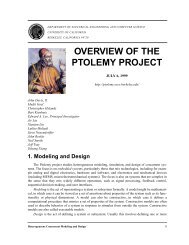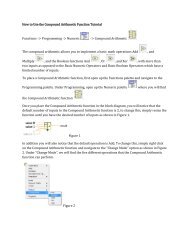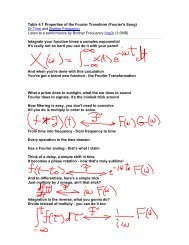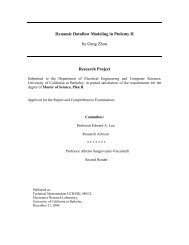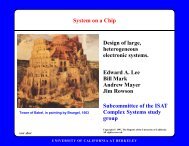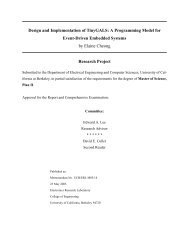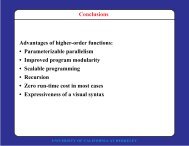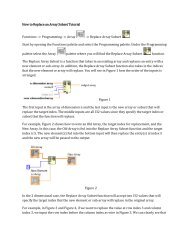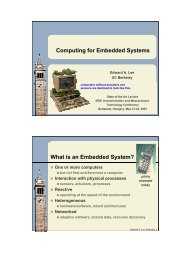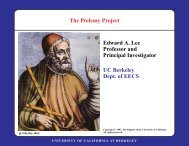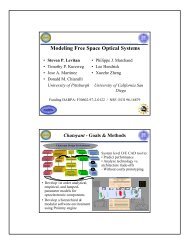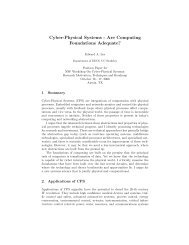PTOLEMY II - CiteSeerX
PTOLEMY II - CiteSeerX
PTOLEMY II - CiteSeerX
Create successful ePaper yourself
Turn your PDF publications into a flip-book with our unique Google optimized e-Paper software.
Expressions<br />
The % operation is a modulo or remainder operation. The result is the remainder after division.<br />
The sign of the result is the same as that of the dividend (the left argument). For example,<br />
>> 3.0 % 2.0<br />
1.0<br />
>> -3.0 % 2.0<br />
-1.0<br />
>> -3.0 % -2.0<br />
-1.0<br />
>> 3.0 % -2.0<br />
1.0<br />
The magnitude of the result is always less than the magnitude of the divisor (the right argument). Note<br />
that when this operator is used on doubles, the result is not the same as that produced by the remainder()<br />
function (see Table 5 on page 119). For instance,<br />
>> remainder(-3.0, 2.0)<br />
1.0<br />
The remainder() function calculates the IEEE 754 standard remainder operation. It uses a rounding<br />
division rather than a truncating division, and hence the sign can be positive or negative, depending on<br />
complicated rules (see page 113). For example, counter intuitively,<br />
>> remainder(3.0, 2.0)<br />
-1.0<br />
When an operator involves two distinct types, the expression language has to make a decision<br />
about which type to use to implement the operation. If one of the two types can be converted without<br />
loss into the other, then it will be. For instance, int can be converted losslessly to double, so 1.0/2 will<br />
result in 2 being first converted to 2.0, so the result will be 0.5. Among the scalar types, unsignedByte<br />
can be converted to anything else, int can be converted to double, and double can be converted to complex.<br />
Note that long cannot be converted to double without loss, nor vice versa, so an expression like<br />
2.0/2L yields the following error message:<br />
Error evaluating expression "2.0/2L"<br />
in .Expression.evaluator<br />
Because:<br />
divide method not supported between ptolemy.data.DoubleToken '2.0' and<br />
ptolemy.data.LongToken '2L' because the types are incomparable.<br />
All scalar types have limited precision and magnitude. As a result of this, arithmetic operations are<br />
subject to underflow and overflow.<br />
For double numbers, overflow results in the corresponding positive or negative infinity. Underflow<br />
(i.e. the precision does not suffice to represent the result) will yield zero.<br />
For integer types and fixedpoint, overflow results in wraparound. For instance, while the value of<br />
MaxInt is 2147483647, the expression MaxInt + 1 yields −2147483648. Similarly, while Max-<br />
UnsignedByte has value 255ub, MaxUnsignedByte + 1ub has value 0ub. Note, however, that<br />
Heterogeneous Concurrent Modeling and Design 97


